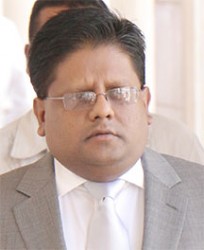– Transparency Institute
The Transparency Institute Guyana Inc (TIGI) yesterday said there was no ground for not proceeding with charges against Finance Minister Dr Ashni Singh for traffic violations related to his February 23 accident, saying the advice by the Director of Public Prosecutions (DPP) to police not to charge is “seriously flawed.”
Last week, the Guyana Police Force announced that legal advice was obtained from the DPP “that no charge be instituted” since the affected parties, Jaggernauth Hira and Parbattie Shivcharran, who were in the car the minister crashed into, have stated that they no longer wish to pursue the matter.
But in a statement yesterday registering its dissatisfaction at the way both the police and the DPP dealt with the case, TIGI said the police force “erred in seeking advice” of the DPP for the traffic violations committed by the minister.

It pointed out that the accident occurred when the minister failed to stop at a major road while driving and as a result he crashed head-on into another vehicle, hurtling it into the nearby trench. “TIGI believes that the DPP’s advice is seriously flawed since the victims’ desire for not wanting to pursue the matter is no ground for not recommending that charges be laid for what was clearly a number of traffic violations,” the group said, identifying the violations as failure to stop at a major road, failure to remain at scene of an accident until the police arrived, failure to render assistance to the victims and reckless and dangerous driving.
On the night of the accident, Hira had told Stabroek News at the scene that Singh offered no assistance to him and his passenger, Shivcharran, who were both slightly injured after the collision. “I was coming down this street [west on Garnett Street, Campbellville] and this vehicle was coming out of this road [Delph Avenue] and just jump the major road, slam into me sending we into that gutter…. The man come out then we see is the finance minister but he ain’t even offer help. He just jump into another vehicle and drive off leaving we hay…,” Hira recounted.
TIGI said few Guyanese believe the minister left the scene to seek medical attention as has been claimed by some government officials. As regards whether or not the minister was intoxicated at the time of the accident, TIGI added that it did not wish to speculate as it has no evidence either way.
After multiple negotiations with Singh’s legal counsel, Attorney General Anil Nandlall, Hira and Shivcharran were compensated and signed a non-disclosure agreement.
TIGI was also critical of Nandlall’s role in the affair and it charged that instead of advising the minister of his legal and moral obligations in relation to the accident, he chose to defend him, acting either in private capacity as a lawyer or in his official capacity, or both. “We know he met with the victims to work out a compensation agreement. In TIGI’s view, the Attorney General’s actions represent a conflict of interest.”
The police had handled the investigation in accordance with a “long-standing tradition” that all cases involving high ranking government officials would be sent to the DPP for review before the police would pronounce on the matter.
TIGI was also critical of this practice, which it said was previously unheard of.
It cited a similar case in Trinidad and Tobago, where a minister was stopped by the police after leaving a nightclub. “He refused to take a breathalyser test and was not only relieved of his position but also charged, found guilty and fined,” it said, referring to Trinidad and Tobago’s former Minister in National Security Ministry Collin Partap. “The police made it clear it was not necessary to seek the advice of the DPP because the issue was a clear cut one.
The Guyana Police Force should take a lesson from its counterpart in our neighbouring twin republic of Trinidad and Tobago,” TIGI added.




